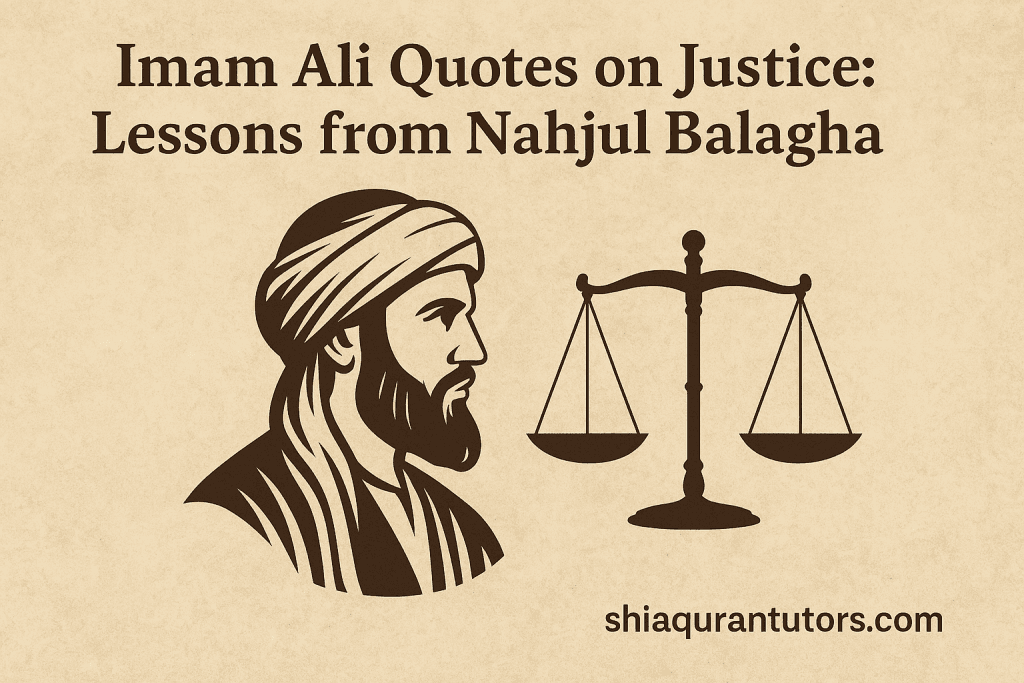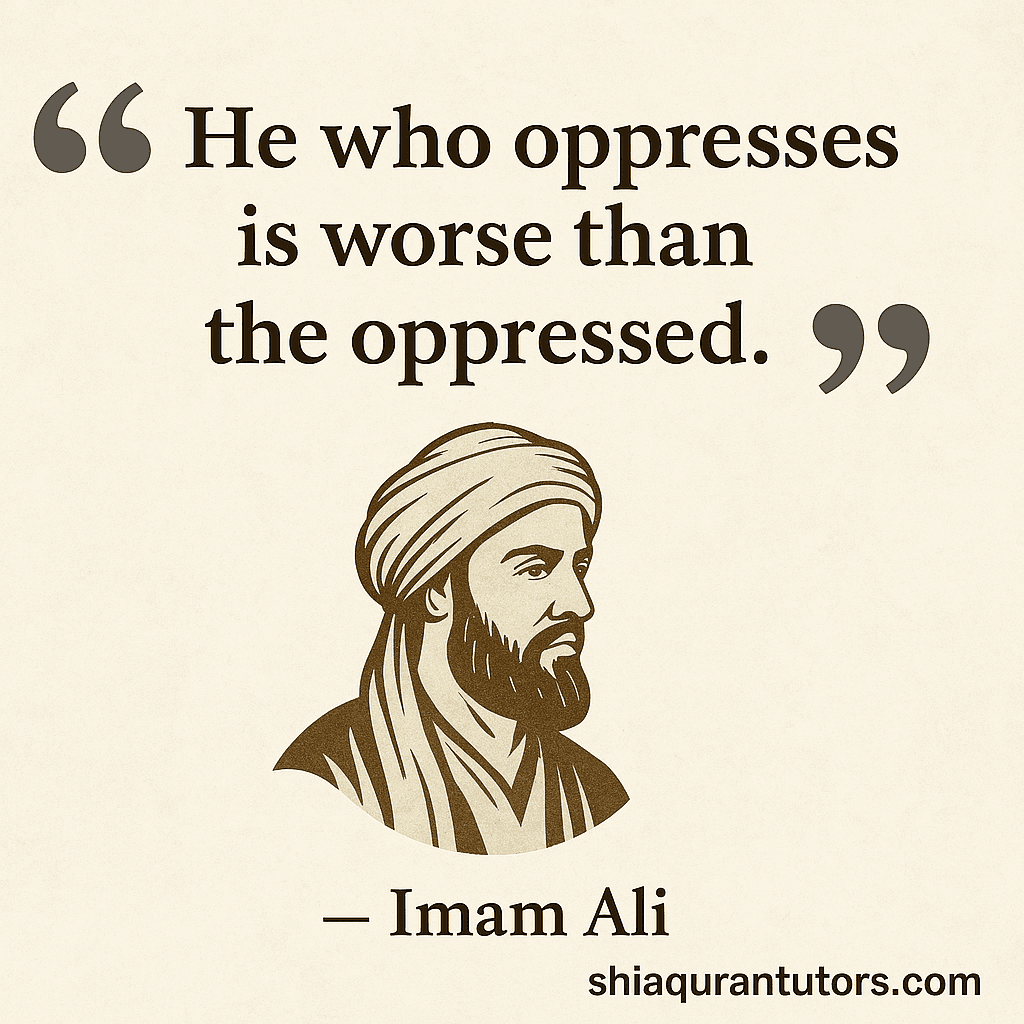
Why Justice in Islam Begins with Imam Ali (AS)
Justice is a cornerstone of Islamic ethics, and no one embodies this principle more perfectly than Imam Ali ibn Abi Talib (AS). As the first Imam in Shia Islam and the fourth Caliph in Sunni tradition, Imam Ali (AS) is widely known as the symbol of justice, wisdom, and spiritual leadership. His words continue to resonate across generations, shaping personal values and governance alike.
At Shia Quran Tutors, we believe that connecting with the teachings of Imam Ali (AS), especially his views on justice, allows us to build more ethical, fair, and spiritually aligned lives. This blog will explore some of his most powerful sayings on justice, primarily from Nahjul Balagha, with reflections that bring them into today’s context.
Justice in Shia Islam and Imam Ali’s Legacy
In Shia Islam, justice is a divine attribute and a core principle of faith. Imam Ali (AS), known as the “Commander of the Faithful” (Amir al-Mu’minin), embodied this principle throughout his life, from his role as a companion of the Prophet (SAW) to his leadership during his caliphate (656–661 CE). His teachings in Nahjul Balagha emphasize justice as a reflection of divine will, essential for spiritual growth and societal harmony. For Shia Muslims, Imam Ali’s commitment to justice is inseparable from his divinely appointed role as the Imam, guiding humanity toward righteousness.
In today’s world, where injustice—such as economic disparity, systemic discrimination, and corruption—remains prevalent, Imam Ali’s words offer a blueprint for change. His teachings encourage us to uphold justice in alignment with the Quran and the Sunnah of the Prophet (SAW) and Ahlul Bayt (AS). This post explores five of his powerful quotes on justice, their meanings, and their applications, with internal links to resources like Shia Quran Tutors’ blog for further exploration and outbound links to reputable Islamic sources for deeper context.
At Shia Quran Tutors, we believe that connecting with the teachings of Imam Ali (AS), especially his views on justice, allows us to build more ethical, fair, and spiritually aligned lives. This blog will explore some of his most powerful sayings on justice, primarily from Nahjul Balagha, with reflections that bring them into today’s context.
1. “Justice is the foundation of governance.”
This profound quote from Imam Ali (AS) sets the tone for what a righteous system should be built upon. Without justice, no ruler or government can sustain trust or divine legitimacy. In Islamic tradition, leadership is not about control but about serving with fairness. As students of the Quran and Hadith, we must remember that justice starts with self-accountability and extends to how we treat others.
Reflection: Imagine if all political leaders truly believed and practiced this — the world would be a very different place.
2. “He who oppresses is worse than the oppressed.”
This saying flips societal norms on their head. Often, people view the oppressed as weak, but Imam Ali (AS) gives them a higher moral standing than those who cause harm. In Shia theology, standing against injustice — even silently — is a form of worship.

Reflection: Whether at work, school, or in a family, never justify oppression. Your silence can either be resistance or acceptance.
3. “The most just of people is the one who judges himself before judging others.”
A powerful reminder that justice begins from within. Before pointing fingers or delivering verdicts, Imam Ali (AS) teaches us to self-reflect.
Reflection: Apply this during conflict. Ask yourself, “Was I fair? Did I contribute to the problem?”
4. “Your sickness is from you, but you do not perceive it. Your remedy is within you, but you do not sense it.”
This isn’t just spiritual—it’s psychological. Imam Ali (AS) explains that justice, healing, and truth come from within. Recognizing personal flaws is the first step toward justice.
Reflection: Self-improvement is justice toward your soul.
5. “A person is either your brother in faith or your equal in humanity.”
One of the most famous and quoted sayings of Imam Ali (AS), especially in humanitarian and interfaith discussions. It reminds us that justice is not only for Muslims but extends to all humans.
Reflection: This quote is even inscribed at the United Nations.
6. “Do not be a slave to others when Allah has created you free.”
Freedom and justice are interconnected. Imam Ali (AS) calls for mental, spiritual, and physical liberation.
Reflection: Free yourself from societal pressure, unjust systems, and even toxic relationships.
7. “The tongue is the ambassador of the heart.”
What we speak reflects our justice or injustice. Imam Ali (AS) warns about using words to harm others, spread lies, or create imbalance.
Reflection: Words can heal or destroy. Choose justice in your speech.
8. “He who shows you your faults is your true friend.”
Justice also applies in friendships. Real love comes from honesty, even if it’s uncomfortable.
Reflection: Encourage your friends to grow, not just to feel good.
9. “People are slaves to this world; as long as they live favorable lives, they are loyal to religious principles.”
This quote cuts deep into the human condition. Many are only religious when things go well. Imam Ali (AS) encourages staying just and faithful even during hardships.
Reflection: True justice is when your character doesn’t change with your condition.
10. “He who is greedy is disgraced; he who discloses his hardship will always be humiliated.”
Justice requires contentment and dignity. Imam Ali (AS) reminds us not to lose our self-worth for worldly gain.
Reflection: Maintain justice in how you see yourself and your needs.
Conclusion.
Imam Ali’s quotes on justice from Nahjul Balagha are a guiding light for Shia Muslims and all who value fairness. His teachings, rooted in divine wisdom, offer practical and spiritual guidance for addressing modern challenges. By embodying his principles—through fairness, compassion, and accountability—we can honor his legacy and build a just world. For deeper insights into his teachings, visit Shia Quran Tutors to explore Quranic and Ahlul Bayt wisdom
At Shia Quran Tutors, we incorporate the teachings of Imam Ali (AS) and all of Ahlul Bayt (AS) in our Islamic education programs. Whether you’re learning Tajweed, Tafseer, or Islamic ethics, our mission is to build not just knowledgeable students, but just human beings.
FAQs – Imam Ali Quotes on Justice
Q1: Where are Imam Ali’s quotes about justice found?
A: Most of them are in Nahjul Balagha, a collection of sermons, letters, and sayings of Imam Ali (AS). You can also explore books and resources through Shia Quran Tutors.
Q2: Are Imam Ali’s justice quotes only for Muslims?
A: No. Imam Ali’s (AS) teachings emphasize justice for all humanity, regardless of religion. One of his famous quotes is, “You are either my brother in faith or my equal in humanity.”
Q3: Can children learn about Imam Ali’s justice?
A: Yes. At Shia Quran Tutors, we teach moral lessons from Imam Ali’s life in a way that is simple, clear, and inspiring for all age groups.
Q4: How can I practice justice in daily life?
A: Start by being honest, fair in your dealings, and reflective. Imam Ali (AS) said that judging yourself before others is the key to justice.
Q5: Where can I study Nahjul Balagha with explanations?
A: We recommend al-islam.org for free access, or you can join our live online Tafseer classes at Shia Quran Tutors.

2 Responses